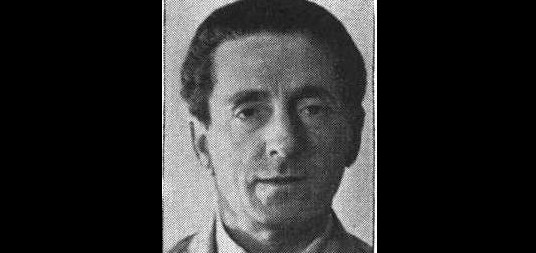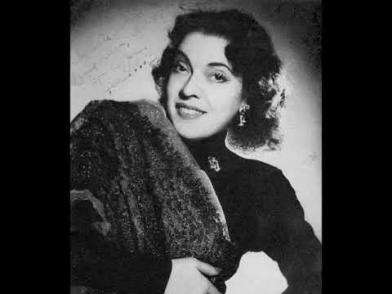Joseph Papernikoff was born in the late 1990s (1897 or 1899) in the Russian city of Warsaw, Poland. He was the son of Malka nee Zorgenstein and Shmuel Papernikoff, a butcher, one of the first members of the Hovevei Zion party, an educated and Zionist activist. Joseph Papernikoff received a traditional education in the 'cheder', and then studied in a Russian Real Gymnasium.
Thanks to his voice, a beautiful alto voice, and his musical hearing, he was accepted at the age of 8 to the choir of the Tlomacka Synagogue in Warsaw under the direction of the cantor Gershon Sirota and conducted by the young Leo Liov and participated in concerts and recordings.
During the First World War, he ended up in Lithuania, occupied by the Germans, and was mobilized by them in the order of labor service. After the war, he returned to Warsaw.
At the age of 16, he began to write songs in Yiddish. His debut song, 'Dos Feld' ('The Field'), was published in issue 4 of the literary monthly 'Yudishe Zamelbelicher' which began to be published in Warsaw that year and edited by Yitzhak Meir Weissenberg. Already in his youth, he approached socialist Zionism, and in the early 1920s he joined the Poalei Zion Left Party, which saw modern Yiddish literature as a central part of Jewish identity. Papernikoff was active in the cultural life of the party and published his poems in a pamphlet edited by Yaakov Zerubavel and Yaakov Kenner (Kenner).
In 1924 he immigrated to Israel and worked as a laborer in paving roads and building in Rishon Letziyon and Tel Aviv. In 1929 he returned to Poland and lived there until 1933 when he finally returned to Israel. During the Holocaust, his parents, four of his five brothers, as well as his uncles, and cousins were killed.
Since 1918 his melodious poetry, with its rich imagery and folklike quality has gained popularity, and Papernikov has published poems (including poems about the life of the Land of Israel), stories, and literary criticism in Yiddish magazines in Poland, Israel, and the United States (as well as in other countries such as France and South Africa). After the establishment of the state, he regularly wrote in the Israeli daily 'Latest News' (in Yiddish). He also published songs in 'The Golden Chain' and was a member of the Yiddish Writers' Association and a member of the Hebrew branch of the International Writers' Organization. In 1927, his first book of poems was published in Warsaw: In Zunikn Land ('In the Sunny Land,' 1927). Until World War II, eight poetry collections by him were published in Warsaw and Tel Aviv, as well as a collection of translations of the poems of the Russian poet Sergei Essenin (1933).
While his poems, which describe the hardships of the pioneers in Israel, are characterized by lyrical quality, his post-Holocaust work, which includes poetry, short stories, and memoirs, is more evident as an allegory.
Papernikoff composed melodies for some of his songs. His poem 'Zol Zayn az Ikh Boy in der Luft Mayne Shleser' ('I Build My Castles in the Air'), to which he also composed a melody, became a popular folk song. Many of his poems have been translated into Hebrew, among others by Yaakov Fichman, Natan Alterman, Alexander Penn, Shimshon Meltzer, and Yechiel Hagiz.
In 1965, a Jubilee book was published in his honor, on the occasion of his 40th anniversary in Eretz Israel: 40 Yor Papiernikov in Erets-Yisroel ('40 years of Papernikoff in Eretz Israel'). Papernikoff has won several literary prizes, including the E. Prize. Leivik (1972), Itzik Manger Prize for Literary Work in Yiddish (1975) and the Prime Minister's Prize for Literary Work in Yiddish for the Lifetime Achievement (1978). In 1988, he was honored as an honorary citizen of Tel Aviv.
Joseph Papernikoff died on March 11, 1993, in Tel Aviv.
His archive, including drafts of his typewriter works, drafts of things about him and photographs, is kept in the National Library of Israel.
His younger brother, Levi Papernikoff (1900–1985), the only brother who survived the Holocaust, immigrated to Israel with his wife and two sons in his late forties, and in Israel wrote Yiddish stories and lists published in newspapers and books.
Source: 'Joseph Papernikoff' in Wikipedia (In Hebrew), and 'Yosef Papernikov' from the Encyclopedia of the Founders and Builders of Israel (in Russian).
Tidhar, D. (1950). Entsiklopedyah le-halutse ha-yishuv u-vonav (Vol. 4, p. 1601)
See also the list of Joseph Papernikoff's publications at the National Library of Israel.
Zol Zayn/ Yaffa Yarkoni:






